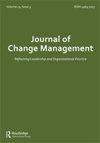Consequences of Managers’ Laissez-faire Leadership During Organizational Restructuring
IF 2.1
Q2 MANAGEMENT
引用次数: 12
Abstract
ABSTRACT This study draws upon conservation of resources theory to investigate if laissez-faire leadership influences employees’ perceptions of role clarity, and two forms of well-being (job satisfaction and work-related burnout), in the context of organizational restructuring. Moreover, role clarity is studied as a mechanism linking laissez-faire leadership to employee well-being. These relationships were tested using a three-wave time-lagged investigation conducted over a two-year period with a sample of 601 employees working in the Swedish process industry. The results of the structural equation modelling analyses showed that laissez-faire leadership was negatively related to role clarity 9 months later. In turn, role clarity mediated the relationship between laissez-faire leadership and employee well-being. This study contributes to the understanding of how laissez-faire leadership in the context of organizational restructuring may affect employee outcomes. We discuss implications for theories and practices, as well as directions for future research. MAD statement The majority of research on leadership during organizational restructuring has focused on positive outcomes of constructive forms of change leadership. However, other forms of leadership, such as laissez-faire leadership, may also play a crucial role for employee outcomes when implementing change. This study is to our knowledge the first to focus on the relationship between laissez-faire leadership and employee well-being in the context of organizational restructuring. We suggest that organizations work actively to include knowledge on this form of leadership in change-leadership training. We also suggest monitoring work-groups’ perceptions of role clarity (as a mechanism directly affected by laissez-fair leadership) during restructuring so that measures can be taken to facilitate transitions when needed.组织重组过程中管理者放任领导的后果
摘要本研究利用资源守恒理论,探讨在组织重组的背景下,自由放任型领导是否会影响员工对角色清晰度的感知,以及两种形式的幸福感(工作满意度和工作倦怠)。此外,本文还研究了角色清晰作为自由放任型领导与员工幸福感之间的联系机制。在瑞典加工工业工作的601名员工的样本中进行了为期两年的三波时差调查,对这些关系进行了测试。结构方程模型分析结果显示,自由放任型领导与9个月后的角色清晰度呈负相关。反过来,角色明晰在自由放任型领导与员工幸福感之间起到中介作用。本研究有助于理解组织重组背景下的自由放任型领导对员工绩效的影响。我们讨论了理论和实践的意义,以及未来的研究方向。大多数关于组织重组过程中领导力的研究都集中在建设性变革领导形式的积极成果上。然而,其他形式的领导,如自由放任式领导,在实施变革时也可能对员工的结果起着至关重要的作用。据我们所知,这项研究是第一个关注组织重组背景下自由放任型领导与员工幸福感之间关系的研究。我们建议组织积极努力,将这种领导形式的知识纳入变革领导培训。我们还建议在重组期间监测工作组对角色清晰度的看法(作为一种直接受自由放任领导影响的机制),以便在需要时采取措施促进过渡。
本文章由计算机程序翻译,如有差异,请以英文原文为准。
求助全文
约1分钟内获得全文
求助全文
来源期刊

JOURNAL OF CHANGE MANAGEMENT
MANAGEMENT-
CiteScore
6.60
自引率
20.00%
发文量
14
期刊介绍:
Journal of Change Management is a multidisciplinary and international forum for critical, mainstream and alternative contributions - focusing as much on psychology, ethics, culture and behaviour as on structure and process. JCM is a platform for open and challenging dialogue and a thorough critique of established as well as alternative practices. JCM is aiming to provide all authors with a first decision within six weeks of submission.
 求助内容:
求助内容: 应助结果提醒方式:
应助结果提醒方式:


